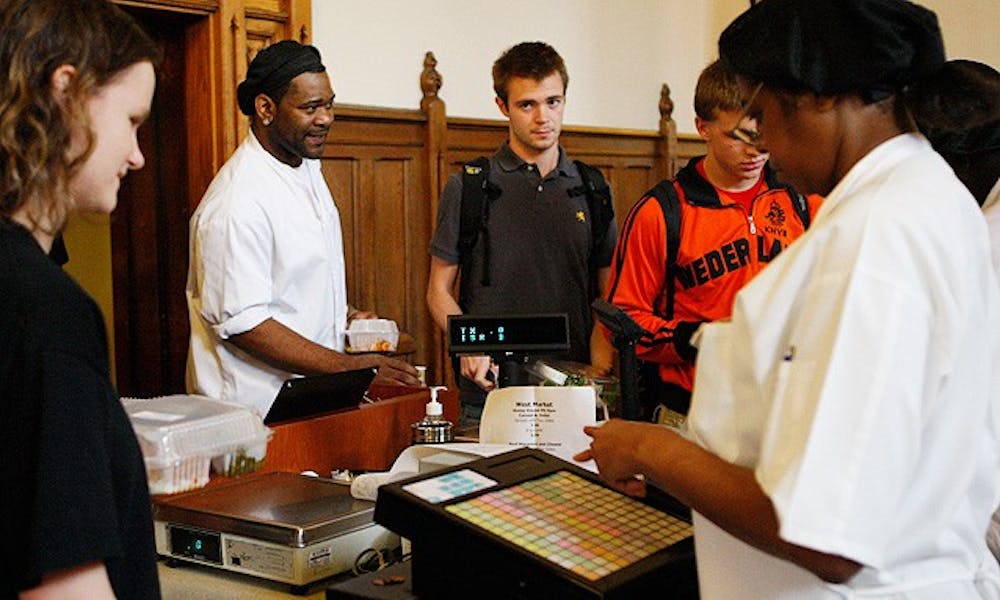Come this Fall, barbecue joint Tommy’s Rubs and Grubs may feature a new menu, more affordable prices, different hours of operation and a new name.
Another restaurant will take the McClendon Tower spot, said Tom Meyer, Trinity ’91 and owner of Tommy’s and The Q-Shack. Meyer added that the new restaurant—which he would still operate—will offer healthier food options.
“As far as I know it’s definitely happening,” Meyer said. “Assuming that we are able to get all the contracted work done and agree on the concept, I don’t see any reason why [the new restaurant] wouldn’t happen.”
This is not the first time Tommy’s has considered closing—in the past year there have been several rumors of the restaurant shutting down. Director of Dining Services Jim Wulforst said the barbecue joint had not been generating substantial revenue in the past year, pointing to its relatively high prices and the construction of K4, the fourth wing of Keohane Quadrangle, nearby, which may have deterred customers from coming to the venue.
“The issue is with all the craziness going on over there, [Tom] was struggling to make ends meet there last year,” Wulforst said.
But Tommy’s is not the only campus eatery that may soon see changes, said Vice President for Student Affairs Larry Moneta. Moneta assumed responsibility for Duke Dining following the June departure of Kemel Dawkins, former vice president for campus services.
Other changes to Dining could include the expansion of Marketplace seating and the reduction in the number of Merchants on Points vendors in the future, Moneta added.
“Nothing dramatically different will happen when we open,” he said, referring to the Fall. “A high priority is East Campus dining and adequacy of space. We are just beginning to think about ways we can identify... additional food venue opportunities on East because we have more students than the Marketplace can really support.”
Although plans are tentative, Moneta said if “quick fixes” are identified to alleviate overcrowding in the Marketplace, changes would likely be implemented by September.
The number of Merchants on Points vendors could also be reduced, Wulforst said, adding that they detract significant revenue from on-campus eateries. Wulforst said likely alternatives include restricting the operating hours of MOP vendors to after 7 p.m.
Although administrators have not begun formally discussing MOP options, Moneta said the “unrestrained growth” of such restaurants could be harmful to the University.
On the other hand, Moneta said completely eliminating the MOP program is not an option, pointing to the lack of space in campus eateries.
“It would be unreasonable to drive all of that traffic back into dining facilities that are inadequate,” Moneta said. “So you have to be cautious about it. But I think we want to make sure that [our] principles... would drive that decision.”
Regardless of what changes might take place, both Moneta and Wulforst emphasized the importance of offering healthy food. Moneta added that he hopes to serve student food interests while making Dining an integral part of the Duke community.
Students, however, have also recently voiced complaints regarding the service at certain campus venues.
In April, results from the Dining Services People’s Choice Survey indicated that students were dissatisfied with the quality of service in campus eateries. Many students referred to negative interactions they had with servers at the Great Hall, the Marketplace and Subway—whose employees are primarily union workers represented by Local 77.
“We continue to take reports we get back from students very seriously,” Wulforst said. “We’ve had two sessions already with our employees in Bon Appétit operations to discuss service attitudes and making service the biggest priority. We want [venues] like the Great Hall... to be the places where we have no complaints. That’s a lofty goal, but I think it’s doable.”
Moneta said the quality of facilities at campus eateries probably plays some role in students’ complaints about service.
“Student frustrations at conditions also get translated into frustrations with the people,” Moneta said. “I’ve been in places with the exact same food, exact same personnel and exact same contractor, but [at] a rehabbed facility... all of the sudden everybody is nicer and the food tastes better. We have to be realistic and try to be appreciative of what it takes to put out a meal.”
Get The Chronicle straight to your inbox
Signup for our weekly newsletter. Cancel at any time.

